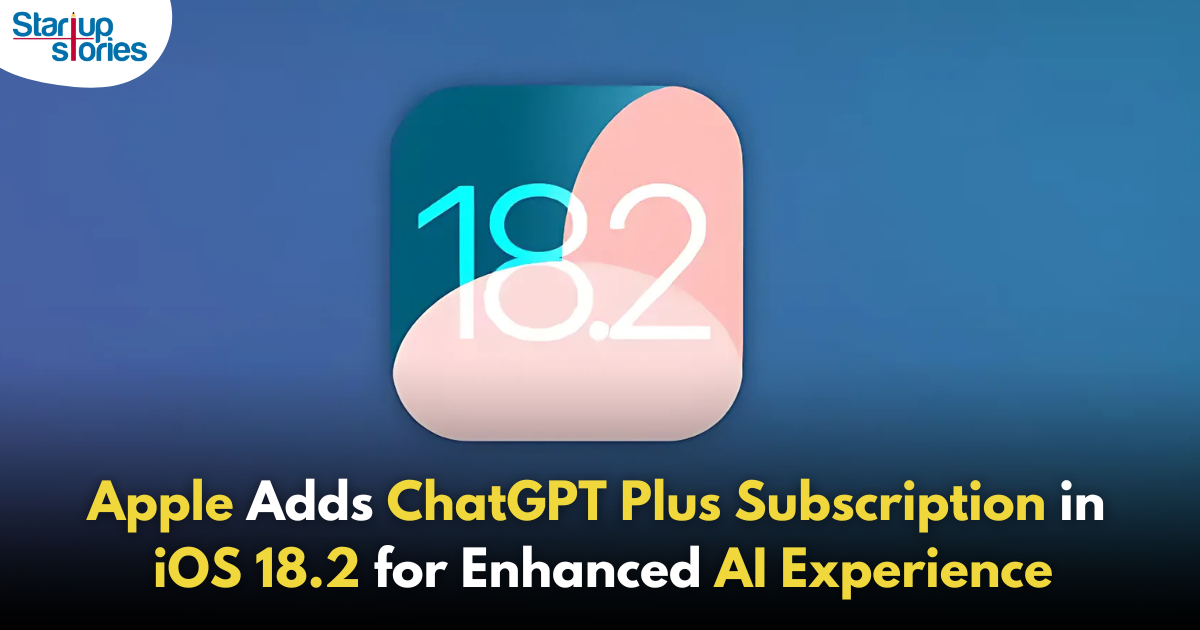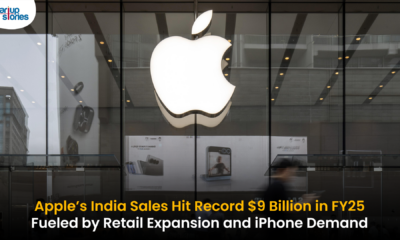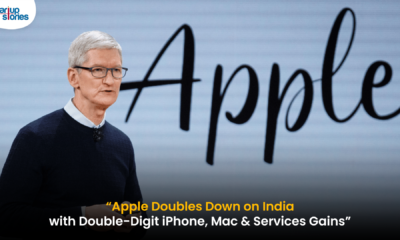Technology
Apple Introduces ChatGPT Plus Subscription Option in iOS 18.2 Beta!

Apple’s iOS 18.2 beta release brings exciting updates, most notably an expanded ChatGPT integration into Siri and Apple’s AI-driven writing tools. This integration includes a new feature that allows users to subscribe to ChatGPT Plus directly through the iOS Settings app.
Enhanced Integration Across Devices
Now embedded across iPhone, iPad, and Mac as part of Apple Intelligence, ChatGPT enhances Siri’s functionality and complements Apple’s existing suite of writing tools. The partnership between Apple and OpenAI, initially launched without a financial agreement, has since deepened, showcasing mutual advantages for both companies.
Accessing ChatGPT Plus
iOS 18.2 beta users can access the ChatGPT Plus upgrade by navigating to Settings → Apple Intelligence & Siri → ChatGPT, where they’ll find the option to “Upgrade to ChatGPT Plus.” Basic ChatGPT capabilities are available without an OpenAI account, but linking an account unlocks more advanced features.
Key Benefits of ChatGPT Plus for iPhone Users
The integration streamlines access to OpenAI’s subscription service, which offers features such as:
- 5x more messages on GPT-4 and access to advanced models.
- Increased file and photo upload limits, with additional features like image generation and web browsing.
- Enhanced real-time voice interaction for more natural conversations.
ChatGPT Plus is currently priced at $19.99 (Rs 1,950) per month, with further details available on OpenAI’s website.
Usage Limits for Free Accounts
Users without an OpenAI account or those on the free plan will have restricted ChatGPT access. iOS 18.2 notifies users of their usage status, ensuring they are aware of their message limits. This transparency helps users manage their interactions with the AI effectively.
Recent Developments in Apple Intelligence
The introduction of ChatGPT Plus is part of a broader push by Apple to enhance its AI capabilities. Recent updates have included various features designed to improve user experience and interaction.
Customizable Profile Cards
Creators can now utilize customizable profile cards, allowing them to personalize their profiles more engagingly. This feature reflects Apple’s commitment to providing tools that enhance creator visibility and interaction on the platform.
Music Integration
Another feature allows users to add a song to their profile, enabling them to express their mood or personality through music. This addition aligns with Instagram’s ongoing efforts to provide more customization options for creators.
Future Prospects
The public release of iOS 18.2 is anticipated in early December, featuring “significant enhancements to Apple Intelligence,” as noted by Bloomberg’s Mark Gurman. As users explore the beta version, they can expect ongoing improvements and new features aimed at enhancing their experience with AI tools.
Community Engagement
With the rollout of these features, Apple is likely looking to foster greater community engagement among its users, particularly creators who rely on effective communication tools to connect with their audience.
Conclusion
The integration of ChatGPT Plus into iOS 18.2 represents a significant step forward for Apple in enhancing its AI capabilities and providing users with advanced tools for interaction. By allowing easy access to OpenAI’s subscription service directly through device settings, Apple is streamlining user experiences while promoting deeper engagement with its AI technologies.
As this partnership evolves, it will be interesting to see how these advancements impact user behavior and whether they lead to increased satisfaction among those utilizing AI-driven functionalities across Apple’s ecosystem. With ongoing developments expected in the coming months, Apple continues to position itself as a leader in integrating cutting-edge technology into everyday user experiences.
News
Google Launches Startup Hub in Hyderabad to Boost India’s Innovation Ecosystem

Google has launched the Google Startup Hub Hyderabad, a major step in strengthening India’s dynamic startup ecosystem. This new initiative aims to empower entrepreneurs, innovators, and developers by giving them access to Google’s global expertise, mentoring programs, and advanced cloud technology. The hub reflects Google’s mission to fuel India’s digital transformation and promote innovation through the Google for Startups program.
Located in the heart of one of India’s top tech cities, the Google Startup Hub in Hyderabad will host mentorship sessions, training workshops, and networking events designed for early-stage startups. Founders will receive Google Cloud credits, expert guidance in AI, product development, and business scaling, and opportunities to collaborate with Google’s global mentors and investors. This ecosystem aims to help Indian startups grow faster and compete globally.
With Hyderabad already home to tech giants like Google, Microsoft, and Amazon, the launch of the Google Startup Hub Hyderabad further cements the city’s position as a leading innovation and technology hub in India. Backed by a strong talent pool and robust infrastructure, this hub is set to become a growth engine for next-generation startups, driving innovation from India to global markets.
Technology
Jio Unveils Cloud PC Service to Bring Affordable Computing to Indian Households

- Jio Platforms has launched JioPC, a cloud-based virtual desktop service that transforms any television connected to a Jio Set Top Box into a fully functional computer.
- Users simply connect a keyboard and mouse to access a desktop-like environment, complete with web browsing, productivity tools, and educational apps—all without needing a physical PC or extra hardware.
- The service is device-agnostic and works with all consumer PC brands, making advanced computing accessible and affordable for millions across India.
JioPC is designed to support a wide range of activities, from professional work to online learning and creative projects. By leveraging Jio’s robust cloud infrastructure, users can run even compute-intensive AI applications directly from their TV screens. The platform also ensures data security and reliability, as all files and settings are safely stored in the cloud, protecting users from data loss even if their device is reset or replaced.
With JioPC, Jio aims to democratize digital access and bring high-performance computing to Indian households at a fraction of the traditional cost. The service supports popular productivity suites like LibreOffice and Microsoft Office online, and Jio is offering a free trial to encourage users to experience the benefits firsthand. This innovative move is set to reshape how people in India work, learn, and connect in the digital age.
Technology
WhatsApp Introduces Ads in Updates Tab, Keeps Chats Ad-Free

Meta has officially begun rolling out ads on WhatsApp, ending over a decade of an ad-free experience since its acquisition in 2014. The advertisements will appear only in the Updates tab, specifically within the Status feature, which lets users share photos, videos, and text updates that disappear after 24 hours—similar to Instagram Stories.
Where Ads Will Appear
- Ads will be visible exclusively in the Status section of the Updates tab, keeping personal and group chats ad-free.
- Businesses can use these ads to encourage users to interact via WhatsApp messaging.
- Meta is also introducing paid channel subscriptions and promoted channels within the Updates tab, allowing users to access premium content and discover new channels more easily.
Privacy and Targeting
Meta has emphasized that private messages, calls, and group chats will remain end-to-end encrypted and free from advertising. Ads will be personalized using limited, non-sensitive data such as location, language, followed channels, and ad interactions. Users can further manage ad preferences if they link WhatsApp to Meta’s Accounts Center.
User and Business Impact
The move marks a major shift for WhatsApp, which has long resisted advertising to preserve a clean messaging experience. While some users have criticized the change, Meta sees this as a significant opportunity to monetize WhatsApp’s 3 billion users and over 200 million businesses on the platform.
In summary, WhatsApp’s new ads will be confined to the Updates tab, ensuring personal messaging remains private and uninterrupted, while opening new monetization avenues for Meta and businesses.













binance-
May 29, 2025 at 12:20 pm
Can you be more specific about the content of your article? After reading it, I still have some doubts. Hope you can help me. https://accounts.binance.info/register?ref=P9L9FQKY
Rejestracja na Binance
August 2, 2025 at 1:27 pm
Your article helped me a lot, is there any more related content? Thanks!
Register
September 7, 2025 at 6:55 am
I don’t think the title of your article matches the content lol. Just kidding, mainly because I had some doubts after reading the article.
MM88
November 5, 2025 at 9:09 pm
Khám phá thế giới giải trí trực tuyến đỉnh cao tại MM88, nơi mang đến những trải nghiệm cá cược thể thao và casino sống động.
GO88
November 6, 2025 at 8:45 pm
Tham gia cộng đồng game thủ tại Go88 để trải nghiệm các trò chơi bài, poker phổ biến nhất hiện nay.
站群程序
November 6, 2025 at 9:51 pm
搭载智能站群程序,自动化搭建与管理,为SEO项目提供核心驱动力。站群程序
Kuwin
November 9, 2025 at 5:03 pm
kuwin sở hữu kho game đa dạng từ slot đến trò chơi bài đổi thưởng, mang đến cho bạn những giây phút giải trí tuyệt vời.
MM88
November 12, 2025 at 3:07 pm
Với giao diện mượt mà và ưu đãi hấp dẫn, MM88 là lựa chọn lý tưởng cho các tín đồ giải trí trực tuyến.
谷歌站群
November 12, 2025 at 11:38 pm
专业构建与管理谷歌站群网络,助力品牌实现全域流量的强势增长。谷歌站群
Verde Casino Spiele Echtgeld
December 20, 2025 at 10:01 am
Vortex Casino, gegründet im Juli 2014, ist eine der
Schwesterseiten von Da Vinci’S Gold Casino und bietet eine
breite Palette an Spielen, darunter Baccarat, Blackjack,
Roulette und Slots. Diese Vielfalt zeigt die Größe und Reichweite des Netzwerks, das Spielern aus Deutschland eine Vielzahl
von Optionen bietet. “Das Casino bietet häufig Gratis-Chip-Boni ohne Einzahlung an. Die Umsatzbedingungen sind hoch! Auszahlungen dauern lange.” Mir gefällt wirklich,
dass Da Vinci’s Gold einen Bonus ohne Einzahlung anbietet, was
es einfacher macht, die Spiele auszuprobieren, ohne im Voraus eigenes Geld
einsetzen zu müssen. Als ich den Nachweis meiner Einzahlung vorlegte, bekam ich eine Entschuldigung, aber ich habe meinen Gewinn immer noch nicht erhalten.
Im folgenden Formular fragt der Glücksspielbetreiber eure Kontaktdaten ab.
Allerdings gestaltet es sich in diesem Internet Casino
etwas kompliziert, den Registrierungsbutton zu finden. Mit insgesamt acht Schwesterseiten und einer breiten Palette an Boni und Spielen bietet die
Da Vinci’S Gold Casino Familie eine attraktive Auswahl für deutsche Spieler.
Spieler können von einer Vielzahl an verfügbaren Boni profitieren, darunter der Erster Einzahlungsbonus, der Willkommensbonus
und der Cashback Bonus.
Obendrein spendiert das Onlinecasino noch 555 Freispiele für den Slot “Gold Bricks”.
Wenn ihr dagegen die Software nutzt, wird diese euch anfangs fragen, ob ihr um Geld oder zum Spaß spielen wollt.
Die Regulierung durch die Curaçao Gaming Control Board stellt sicher, dass
die Spieler in einer sicheren Umgebung spielen können.
References:
https://online-spielhallen.de/dein-vulkan-vegas-casino-cashback-so-funktionierts/
Casino Mate bonus
December 27, 2025 at 5:39 am
Another weekend bonus offer that you can benefit from on Sundays.
The get three parts of this promotion, you need to deposit AU$20 at least.
Finally, you can also claim the fourth part of this promotion, which will provide you
with 20 free spins to play the “Sun of Egypt 2”
slot. The second offers 40 free spins that you can spend on betting on the
Dragon Pearls slot machine. The minimum deposit required for this campaign is AU$20.
This is a special offer from Casino-Mate, allowing you
to boost your deposit amount.
The casino games section of Casino Mate is a treasure trove of excitement and entertainment.
Enjoy customized bonuses, exclusive promotions and special offers designed just for
you. When you play your favorite games at Casino Mate, you will earn Loyalty Points that
will increase your status in the program. That’s why the platform has created
a loyalty program designed to reward your loyalty and
improve your gaming experience. To enhance your gaming journey and increase your chances
of winning big, the platform offers an unbeatable welcome package.
Join today and embark on an unforgettable journey through the realm of
online gambling!
It applies not only to the users’ personal info or data but also to transaction procedures and
money transfers. The system doesn’t charge commission for deposits or withdrawals.
For additional information about the time of transfer, visit
the corresponding section of the website. All of them have proven to
be reliable providers of the licensed gaming software that fully complies with industry standards.
It means that you may try each game right here with a click in a flash mode.
The Casino Mate bonus is activated after entering the
correct code.
national casino australia
December 27, 2025 at 7:50 pm
And if your eyes diverge after opening Casino Mate, keep reading to learn the description of the platform’s gaming options.
What is more, additional amounts of money that you might receive
every day will be a nice bonus to your advanced skill in gambling.
Although a reliable platform must meet specific criteria, it will only be remarkable with a wide selection of high-quality games.
All bonus money must be wagered within the 50x wagering requirement before
withdrawn and the minimum deposit amount is $10. The player will enjoy a 100% match deposit bonus,
up to $100, on their first deposit. This makes it part of a group
that is world known for offering safety, high levels
of customer support, and high quality games. The variety of games keeps me entertained for hours, and the regular promotions add extra value
to my gaming sessions. Our platform stands as
a testament to what’s possible when player satisfaction becomes the driving force behind every decision, every feature, and every game selection.
References:
https://blackcoin.co/best-high-roller-casinos-in-canada/
https://jobs.atlanticconcierge-gy.com/
December 29, 2025 at 9:26 am
paypal casinos for usa players
References:
https://jobs.atlanticconcierge-gy.com/
excelrenforcement.com
December 29, 2025 at 9:38 am
casino mit paypal
References:
excelrenforcement.com
hg3b25hm0h.com
December 30, 2025 at 2:15 pm
online casino usa paypal
References:
hg3b25hm0h.com
https://dreamyourjobs.com
December 30, 2025 at 2:33 pm
casino online paypal
References:
https://dreamyourjobs.com/employer/best-payid-pokies-in-australia-2025-pokies-that-use-payid/
Binance úcet
January 26, 2026 at 1:00 am
I don’t think the title of your article matches the content lol. Just kidding, mainly because I had some doubts after reading the article. https://www.binance.info/register?ref=IXBIAFVY
Binance推荐
January 30, 2026 at 9:26 am
I don’t think the title of your article matches the content lol. Just kidding, mainly because I had some doubts after reading the article.